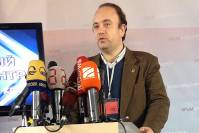The Crimean referendum’s neo-Nazi observers

Far-right Catalonian politician Enrique Ravello called the referendum "an example for us"
It is difficult to hope for respectable friends when you have just invaded another country’s territory without so much as a declaration of war, but the Kremlin’s props for their Crimean intervention are a seriously motley bunch that includes a large number of “independent” observers with known far right leanings.
When the second - after Syria - country to declare its support is North Korea, Russian press agencies might have considered remaining silent. The same might be said of media reports about "international observers" for the March 16 referendum called by the puppet government installed on Feb 27.
The date of this fast-track referendum was announced on March 6, giving just 10 days to organize procedure for both the voting and vote count. As reported, there are two questions with no option for choosing the status quo: it’s either joining Russia or saying yes to a form of autonomy in force for just a few days back in 1992. There is no minimum turnout and no procedural guidelines at all. The Crimea has been awash with billboards which claim that the choice is “Nazi rule” or a Crimea bathed in the blue, white and red of the Russian flag. It has become dangerous to express alternative views, and the whereabouts of a number of Ukrainian civic activists remain unknown. Almost all Ukrainian television and other media have been taken over with frequencies now used by Russian channels.
The referendum was declared unconstitutional by Ukraine’s Constitutional Court on March 13 and with cause since the Constitution stipulates that any decision changing Ukraine’s territory must be put to a nationwide vote. The Crimean Tatars have reiterated that they are boycotting the exercise and consider it illegitimate. This is the position of the USA and EU countries, the European Parliament, the OSCE and Ukraine’s two main election watchdogs - the Committee of Voters of Ukraine and OPORA.
However on Saturday, the Russian state-funded Russia Today and a report from the website E-Crimea both reported "international observers" as claiming that the referendum was entirely legitimate and aboveboard. None of them finds anything untoward about a referendum held in the presence of soldiers with automatic rifles, and easily verifiable facts, such as the removal from air of Ukrainian channels, are simply denied.
Russia Today mentions 30 observers from 10 European Nations, and quotes five of them. E-Crimea claims there are 135 from 23 countries, and names three. All those quoted appear to have spoken of the democratic and fully legitimate nature of the referendum more or less on arrival in the Crimea.
It seems likely that this has more to do with the observer, not what is observed, nor exactly, with their highly specific political views. The director of the European Geopolitical Analysis Centre and the mission coordinator, Mateusz Piskorski, together with Hungarian MEP Béla Kovács, Belgian political activist Luc Michel, and Spanish MEP Enrique Ravello all have strong links with the far right. If Piskorski’s penchant in the 1990s for a form of “National Socialism” that praised Hitler and fascism could be charitably called a youthful aberration, this is categorically not the case with the others. Ravello can be seen addressing a London far-right forum in anti-immigration, xenophobic mode here: https://youtube.com/watch?v=d3XjgJhJ-XA Michel is also from the far-right and a former member of the neo-Nazi movement Fédération d’action nationaliste et européenne. He is now apparently a supporter of National Bolshevism.
Béla Kovács is treasurer of the Alliance of European National Movements, which includes the xenophobic and anti-Semitic British National Party among its founding members. Given the Kremlin narrative about the need for Russia to protect its nationals against the supposed “fascists and anti-Semites” who have seized power in Kyiv, the Alliance’s Statement on Ukraine is well-worth reading.
One especially telling detail is the justification for not supporting Ukrainian nationalists against an attempt by Russia to annex the Crimea. The section reeks of anti-Semitism in its attempt to claim that the “Red Terror was not Russian”:
“Indeed, the radical Jewish racism and supremacism and anti-Christian hatred that in the 1930s produced the Bolshevik terror, now largely find their outlet in the extreme Zionism, anti-white fanaticism and globalism of the neo-cons”
“Ukrainian nationalists … have been manipulated, organised, funded and armed by sinister forces in the West, which are in reality very far from being Western. … This explains and justifies the Russian intervention in the Crimea, which as well as being a strategic area within Russia’s legitimate sphere of influence is also populated by ethnic Russians.”
“Further, Ukrainian chauvinists have a shocking record of launching brutal ethnic cleansing massacres of minorities, in the 1940s (mainly Poles and Hungarians, who were targets of the hatred now beginning to be displayed towards Russians). So it is not surprising or unreasonable for Putin to show that he is prepared to intervene to protect the huge Russian population of eastern Ukraine.”
Invitations to join these "independent observers" were also apparently sent to the head of the French National Front Marine Le Pen, the chairman of the Italian Lega Nord, Lorenzo Fontana and the leader of the Freedom Party of Austria Andreas Mölzer,
The attempted storming of the regional administration in Donetsk and violence which left at least one person dead were led by the neo-Nazi Pavel Gubarev and seem to have had the support of skinheads and other far right individuals from Russia. Since the Kremlin’s battle for the Crimea has gained the support of the most primitive Russian nationalist elements, it is probably no surprise that European political movements of the far right should be joining suit.
These are seriously strange fellow travellers for those liberal western journalists and commentators entranced by the idea that Russia is merely defending an ethnic minority or championing the cause of anti-fascism.





